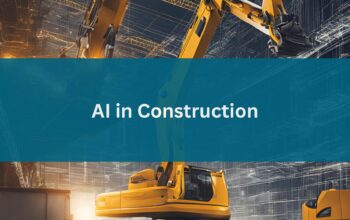While the construction industry has got off to a slow start with its digital transformation efforts, there are undeniable signals that the industry is changing. In the past few years, the amount of technology vendors offering ways to improve business intelligence across processes and people has soared. And, businesses are starting to realize the benefits of investing in new technology. A recent industry report has shown that 81% of construction businesses plan to enact or put in place an initiative to improve their business digitally within the next 12 months.
However, as always, change doesn’t come without its challenges. More than just a financial investment is needed, change requires a cultural shift too. It is only with a change in mindset that the industry can overcome historical attitudes, fully adopt digital technologies, and realize its many benefits.
Benefits of Digital Technology for the Construction Industry
Digital technology has a lot to offer the construction industry, and while change can seem daunting for some, it promises some undeniable benefits:
- Increased productivity – the amalgamation of technologies in workflows can help to increase productivity. Technology can offer a faster way to select, fund, and deliver projects. Every gain in efficiency will improve the bottom line.
- Enhanced collaboration – the ability to connect all project stakeholders in real-time is invaluable. This enables teams to pool resources and knowledge with the shared goal of completing a project on time and within budget.
- Improved safety – using technology to mitigate health, safety, and environmental risks is a huge benefit to the construction industry, infamous for its high-level risks on-site.
By embracing digital technology, construction firms have the opportunity to increase commercial performance, improve project and operational control, and build stronger relationships with their supply chain. And, all of this leads to increase client satisfaction, a key driver behind successful construction businesses in today’s digital world.
The Challenges and Drivers of Implementing New Technology
While the benefits may seem obvious, there are several reasons why the construction industry has been slow to adopt digital technologies. Some of the critical challenges that need to be addressed if digital transformation is to be driven forward include:
- Unlocking new design efficiencies – adapting business models to accommodate new technologies can be extremely challenging. This is due to the project lifecycle disconnect between the design, build, and supply chain.
- Redefining the bidding process – bid preparation and submissions are both costly and unpredictable, with outdated manual processes being commonplace. The accuracy of bids is a core challenge, which needs to be addressed with the help of technology but also a new bidding process to level the playing field.
- Improving cash flow – the fragmented nature of the sector’s supply chain has been a blocker to change for some time. While technology can support supply chain management, new government standards are needed to help manage payments.
- Facilitating data-led decisions – currently, most construction companies spend their IT budgets on back-end finance and admin systems. This means there is little automation to enable commercial decisions to be data-led.
- Supporting resourcing and labor planning – an aging workforce combined with skill shortages has had a significant impact on the industry’s labor market. Businesses need a way to maximize their resources and become more efficient.
At the moment, planning for many construction projects is done on paper, and there is a distinct discontent between field and office workers. Their needs to be an alignment between process, tools, and skills if digitization is to be successful. To achieve this, standardization of technology needs to happen across the supply chain, and decision making needs doing at the frontline.
How Technology Will Change the Way Construction Businesses Operate
Technology is set to change how construction businesses operate, which will affect both the workforce and customers. Fundamental changes to be expected over the coming year, including:
- Increased offsite manufacturing – enabling businesses to manage constraints around site storage, on-site labor intensity, and risk, and quality control. Technology allows hundreds of moving parts and conversations to happen simultaneously.
- Improved communication – collaborative working tools enable dispersed teams to work together and ensure that projects are correctly aligned. The ability to collaborate using connected apps and software means that progress can be tracked, and client needs more easily met.
- Integrated supply chain – control over the entire supply chain from design to build will allow for more integration of processes and data. This will create a cohesive system in which the end-to-end process of design, manufacturing, and installation can be managed and optimized.
- Standardized ‘green’ construction – with global controls on carbon emissions, businesses need to be environmentally aware. The Internet of Things (IoT) and 3D printing can help efficiency and reduce waste. Meanwhile, with data-led decision making, waste will be reduced. Data analysis of materials over time will also offer valuable insight into sustainability.
- Shortened timelines – the ability to complete projects faster and more efficiently using platforms to increase visibility, improve workflows, and streamline scheduling. This will result in shorter timeframes and a rise in client expectations.
- Improved safety – with work execution platforms, businesses can shorten response items, log and track safety inspections, and ensure documentation is recorded and stored accurately.
- Increased automation – to cope with the shortage of skilled workers, construction companies need to improve speed and efficiency vastly. Mistakes can be costly, and automation enables firms to stretch resources and eliminate bottlenecks.
What are the recent Digital Transformation trends?
Digital technology has the potential to reshape the construction industry from a flat, unconnected system to a powerful aggregation of data and science. Some of the key trends and technologies that are coming into play include:
- Drones – used for site inspections to locate hazards or track project progress.
- Robots – used to perform repetitive and high-risk tasks.
- Artificial intelligence – to capture reality or create digital twin models.
- Autonomous equipment – completing site work based on 3D models with the help of sensors and GPS.
- Supply chain management – software to help hire workers and procure equipment and materials, thus increasing productivity and increasing bid accuracy.
- Building Information Modeling (BIM) – digitally representing buildings in 3D models and then using virtual and augmented reality to simulate the real environment.
- Biometric identity software – to help with labor management, giving more workforce visibility, improving forecasting, and increasing workforce flexibility.
- Blockchain – monitoring how information is shared, recording value exchange, and administering smart contracts.
Digital Disruption to Date
Digital disruption has been slow to arrive in the construction sector, but it is beginning to have an impact. To make change significant, a variety of technologies need to be implemented simultaneously. Ultimately these technologies will work together to solve the issues of productivity, time management, safety, and overall project management.
New technologies are going to force construction companies to look at their processes differently in the future. There won’t be one answer, but instead several possible ways to optimize ways of working across the entire supply chain. Adoption of digital transformation will be strategic, with a focus on practical digital tools and systems, which can have the most significant impact on productivity and profitability.



